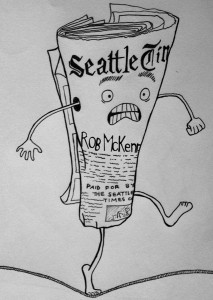Voters must be wary of endorsements
The Seattle Times came under fire last week for running a full-page, color advertisement supporting Republican gubernatorial candidate Rob McKenna. More than 100 Times staff members signed a protest in response and some readers called to cancel their subscriptions. Underneath the advertisement, these words were written: “Paid for by The Seattle Times Company.”
News reporting is supposed to be unbiased and informative. For The Seattle Times Company to pay for and publish a political commercial advertisement is irresponsible and an example of bad journalism. But the deeper, more significant controversy is the weight a newspaper’s support of a candidate should carry.
Reporters have a duty to maintain an unbiased stance and objectivity, especially during an election. How, then, can the public trust a publication to support one candidate over another without sacrificing its integrity?
We can’t — even reputable publications are prone to letting bias influence the way they report the news. As voters, we must be wary of the potential agendas of news outlets no matter how professional they seem, or we risk making a misinformed decision when we cast our ballots on Nov. 6.
To be fair, the Times’ mistake wasn’t entirely the newspaper or journalists’ fault. Executive Editor David Boardman wrote a column addressing the advertisement, explaining the decision was made by the business side of The Seattle Times Company. Because of a lack of communication, Boardman said he was unable to stop the advertisement from printing.
The newspaper’s editorial section, however, had previously professed its support for McKenna with an endorsement in June, so it was no secret which candidate The Seattle Times supported. Readers, though, should have been able to trust the newspaper to continue fairly reporting on both sides of the election.
By paying for a political ad, the Times Company went beyond an endorsement and compromised its newspaper’s integrity as well as its readers’ trust. So, the company crossed a line between a necessary separation of news media and politics. It’s permissible for a newspaper to publish an editorial arguing for or against a candidate, to run advertisements paid for by the campaigns themselves or to endorse a candidate. It is not permissible, however, for a newspaper to sacrifice its independence by paying for a political ad.
The Times Company’s mistake should serve as a reminder to all of us, especially during election season, that newspapers are not always as married to their ideals as they might seem. Impartiality remains crucial for a newspaper to maintain, but any publication that strives to be objective and impartial still carries opinions.
In the upcoming election, voters must remember that we need to watch the watchdogs. Just because a newspaper claims to objectively report on the plans and policies of both candidates equally doesn’t mean the information isn’t subtly biased one way or another.
Moreover, voters should keep in mind that even a newspaper’s official endorsement of a candidate is not the end-all-be-all; endorsements are quite limited in their influence. We often choose the media that reflect our beliefs and political leanings, so endorsements generally change few reader opinions. Endorsements theoretically have the potential to cause a real impact in swing states, but there is little research on the extent to which they actually sway voters.
Whether we like it or not, we rely on the news media heavily during election season to stay informed. As news consumers and voters, it’s important to keep in mind that the information we’re exposed to can shape how we view a candidate. The best way to become an educated voter is to keep a healthy skepticism when making voting decisions in the days until the election — whether it’s obvious or subtle, bias has a way of interfering with good reporting.
Burke Gibson is a sophomore majoring in economics and is the Daily Trojan’s Chief Copy Editor. His column “Press Pass” runs every other Thursday.

